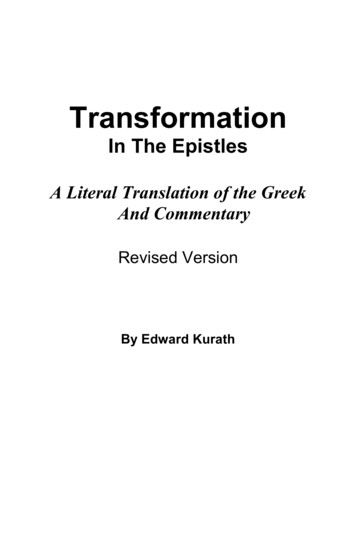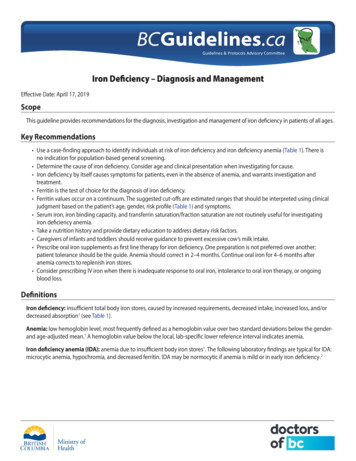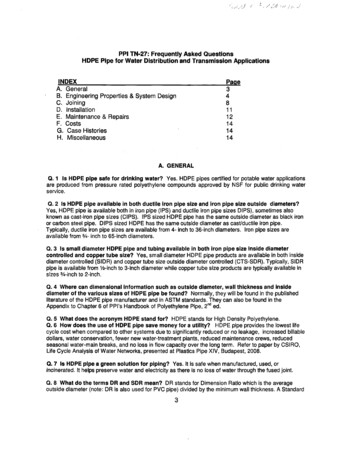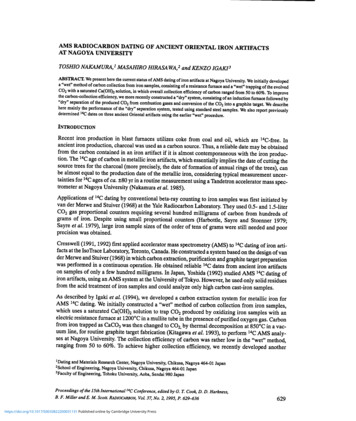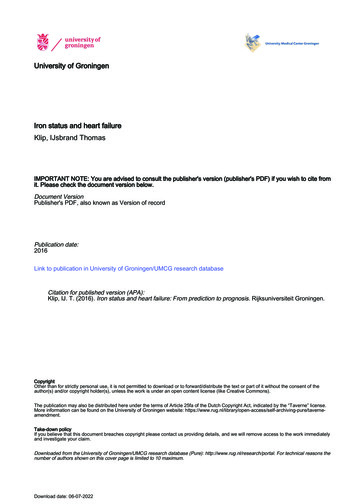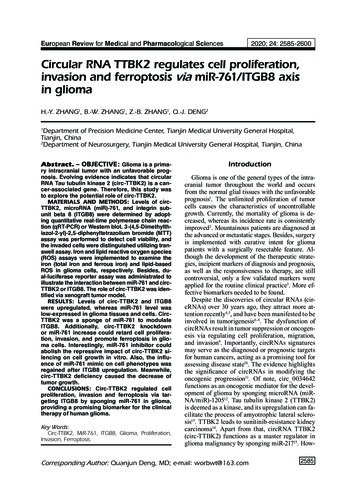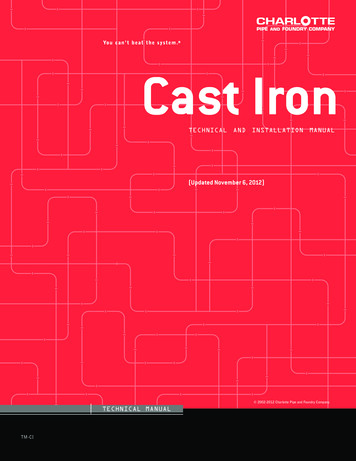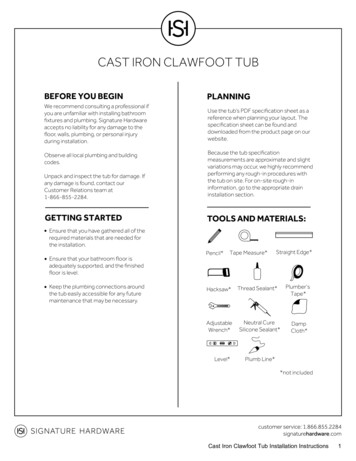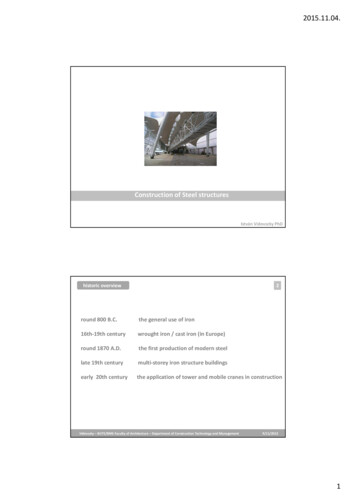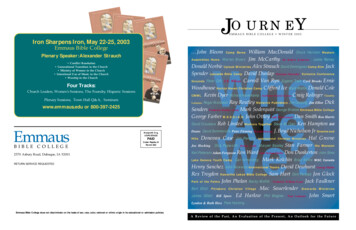
Transcription
JIron Sharpens Iron, May 22-25, 2003Emmaus Bible College.John BloomPlenary Speaker: Alexander Strauch Conflict Resolution Generational Transition in the Church Ministry of Women in the Church Intentional Use of Music in the Church Worship in the ChurchFour Tracks:Church Leaders, Women’s Sessions, The Foundry, Hispanic SessionsPlenary Sessions, Town Hall Q&A, Seminarswww.emmaus.edu or 800-397-2425EmmausBIBLE COLLEGENonprofit Org.US POSTAGEPAIDCedar Rapids, IAPermit 8602570 Asbury Road, Dubuque, IA 52001RETURN SERVICE REQUESTEDO U R N EYE M M AU S B I B L E C O L L E G E W I N T E R 2 0 0 2William MacDonald Chuck Harrison WesternAssemblies Home Warren Brown Jim McCarthy Sir Robert Anderson Leslie RaineyDonald Norbie Uplook Ministries Alex Strauch David Dominguez Camp Elim JackSpender Lakeside Bible Camp David Dunlap Welcome Detweiler Koinonia ConferenceGrounds Peter Clift T.E. Wilson Carroll Van Ryn Eugene Train Cyril Brooks ErnieWoodhouse Horton Haven Christian Camp Clifford Ice Mark Mattix Donald ColeCMML Kevin Dyer Richard Haverkamp Anthony Norris Groves Craig Rolinger TimothyLoizeaux Roger Malstead Ray Routley Walterick Publishers Jim Cocking Jim Elliot DickSanders Frederick Stanley Arnot Mark Soderquist George Bristow Emmaus Bible CollegeGeorge Farber M.E.S.S.I.A.H. John Ottley Lady Powerscourt Dan Smith Ron HarrisDavid Croudace Rob Linsted Workers Together Steve St. Clair Ken Hampton BillDeans David Sommerville Peter Fleming Harold Mackay J.Boyd Nicholson Jr GreenwoodHills Donovan Case Jim Fleming International Christian Ministries Hal GreeneJoe Hocking Dick Papworth Henry Craik Maryen Baisley Stan Farmer His MansionKarl Peterson Adam Ferguson Ron Ward John Nelson Darby Don Dunkerton John SimsLake Geneva Youth Camp Carl Armerding Mark Kolchin Brian Killins MSC CanadaHenry Sanchez John Ferwerda International Teams David Dewhurst George MullerRex Trogdon Kawartha Lakes Bible College Sam Hart Dick Farstad Jon GlockPark of the Palms John Phelan Becky Moffitt Frederick William Grant Jack FaulknerBert Elliot Pittsboro Christian Village Mac Sauerlender Stewards MinistriesJames Gillett Bill Spees Ed Harlow Phil Wagner Paul Loizeaux John SmartCamp BereaWhoAreWe?Lyndon & Ruth Hess Pete Hocking. . .Emmaus Bible College does not discriminate on the basis of sex, race, color, national or ethnic origin in its educational or admission policies.A Review of the Past, An Evaluation of the Present, An Outlook for the Future
JO U R N E Y JM A G A Z I N EFeatures5WhoAreWe?14Who Are We?Can you put the puzzle of the Assembly Movementtogether into one picture? Here’s some help.2528The Autonomy of the Local ChurchJourney Magazine, volume 2, issue 3, Winter 2002From the President3Ask the FacultyMark Woodhouse responds to a question concerningthe honoring of father and mother.Opinions expressed in articles published in JourneyMagazine are not necessarily those of EmmausBible College.5Two Polished Arrows: Bert and Colleen Elliot –Church Planters in Peruby Kenneth C. FlemingSubscriptions to Journey Magazine are sent freeof charge to addresses in the United States andCanada, as well as to those serving the Lord fulltime overseas. Please contact “Subscriptions” atthe address below for additions, corrections, ordeletions.8“ And they Continued”by David A. Glock12Trail Guides14Who are We?25The Marks of a New Testament Churchby Dr. Daniel H. SmithJourney Magazine is published by Emmaus BibleCollege, Dubuque, Iowa, USA.Editorial Group: Kenneth A. Daughters, David A.Glock, Kenneth W. MurrayBible Editor: Dr. David J. MacLeodCirculation Manager: Nancy FergusonDesign, Layout, Editing: Jesse Lange, Nancy Ferguson,Susan TylerContributing Editors: Dr. Daniel H Smith, Dr. HenryPitman, Dr. David J. MacLeod, Robert Tyler,Christine Schneider, Kenneth C. FlemingOnline-Journey: Mark WoodhouseHow to contact us:28The Autonomy of the Local Churchby Jack Spender30Where We Fit in the Spectrum ofEvangelicalismby Dr. Ted GrantJack Spender30M A G A Z I N E2The Marks of a New Testament ChurchDr. Daniel. H. Smith11 points that distinguish a New Testament Church DepartmentsTwo Polished Arrows: Bert and Colleen Elliot– Church Planters in PeruKenneth C. FlemingFollow our Missions Reporter, Ken Fleming, in his fieldreport from Peru recording the planting of 132 localchurches.O U R N E Y32Dr. MacLeod AsksWhere We Fit in the Spectrum ofEvangelicalism33News from EmmausDr.Ted Grant38On the RoadJourney MagazineEmmaus Bible College2570 Asbury RoadDubuque, IA 52001(800) 397-2425www.emmaus.eduEditor: journey@emmaus.eduSubscriptions: journey@emmaus.eduCollege Admissions: sschimpf@emmaus.eduAlumni: jdunkerton@emmaus.eduCorrespondence School: ecsorders@emmaus.eduBelievers Stewardship Services: stwrdshp@aol.comOther: info@emmaus.eduJourney Magazine is available on-line at:www.online-journey.com40How to Resolve Conflicts in the ChurchBen Mathew39Readings40How to Resolve Personality Conflicts in the Churchby Ben MathewJourney Magazine will consider, but is not responsiblefor, unsolicited articles. Send submissions to Editor atthe address above. Submissions cannot be returnedunless accompanied by SASE. Advanced query isrecommended.
JourneyWinter 2002From the Presidentthan optimum manner. It is true that those who leaveOne of our greatest concerns is for the healthus say they miss the way we break bread. But theyand growth of the assembly movement. Our missionstill leave us. What can we do?of education is to train servants and leaders toActually, it is not what we are doing that is constrengthen their home churches and to spread thetributing to the loss of our people.gospel worldwide.They were with us before becauseUnfortunately we see a trend inthey agreed that we understoodwhich young people and youngthe apostolic pattern of gathering.families are giving up on theIn most cases they left us becauseassembly movement and turnwhat we were doing, we were noting to other churches for theirdoing very well. To borrow asustenance and ministry. Tosports analogy, we have the rightlose our young people is to losegame plan; we just need toour future. We believe that thisexecute it well.exodus is unnecessary andOur goal in the next few issuesharmful.of Journey is to understand ourWhat can we do? First weheritage and our potential, tomust understand why peopleexamine where we came from andare leaving. Some leave becausewhere we should go. We ought tothey feel their needs are notpractice New Testament principlesbeing met. Others leavewith excellence and relevance.because they feel they have noStrong, quality leadership is necessay in the direction the assemsary, as is devoted pastoral care.bly will take in the future.We would like to be able to adjustNeither of these reasons needsto the changing needs of ourto be the case. The Newpeople. We ought not change ourTestament structure of ourtheology, but we would like toassemblies makes them simpleimprove some of our deliveryenough to adapt to each newmethods.culture and situation to remainPresident, Emmaus Bible CollegeThere is much to thank Godrelevant and productive. Wefor as we see our successes. The intent of this issue ismust make sure, however, that we remain simple andto appreciate how varied our ministries are and whatuncomplicated enough to adapt quickly to changinga large contribution we make to the growth of theneeds.Church. Since we tend to be focused primarily on ourConsider, for example, two of our most cherishedown local works, sometimes we lose perspective. Godvalues: the priesthood of every believer and the cenhas truly blessed us. It is our intent that this overviewtrality of worship. We imagine that our emphasis onwill encourage us to press on to seek God’s blessingthese New Testament principles in church practicefor the growth of our churches and the assemblyshould be distinct enough for us to retain our people.movement as a whole.We imagine that other churches worship in a less2Ask the FacultyI am a Lombard Gospel Chapel “regular” and I am looking for an articleon what it means to honor thy mother and thy father. Can you help?G. Mark Woodhouse, FacultyDirector of Computer Systems Management ProgramEmmaus Bible CollegeThe concept of honoringfather and mother carries withit a number of implications andcorollary questions. Is honoringsimply obeying? Is it simply amatter of showing due respect forour parents? Does the expressionof honor change as we grow older?What about when we are out“on our own”?There is no doubt that thiscommandment is critical in thelife of a believer. As the first of thecommandments with a promiseassociated with it (Ephesians 6:2),it is imperative that we attend tothis important principle. It is alsoa lifelong requirement. We cannotsay, “I have adequately honoredmy parents up to this point, andnow I can do otherwise.” Whilethe expression of our honor forour parents may change, it’sconstancy cannot.Perhaps the most effectiveway to consider this principle isthrough an examination of howhonor for our parents is expressedthroughout the “seasons of life”.As a person matures in everydimension of life – intellectually,physically, spiritually, and socially(Luke 2:52) – the roles that areappropriate for that individualchange accordingly. If we considera general case where we divide ourlives into 20-year segments (or“seasons”), we can see a clearlydefinable shift in motivations,activities, and expectations fromone season to the next.During the first 20 years oflife, we are learners.We attend school. We developin our spiritual understanding. Wedevelop self-discipline and formour work ethic. We observe thosewho lead us and try to emulatethem. The fundamental influenceon us during this season of life is3
Journeyour parents. Honoring them isexpressed in several ways – showing respect, obeying them, adopting their values, heeding theircounsel, and so on. Our primarymotivation during this season is tobe a disciple, and others expect usto focus on our learning.During the second 20 yearsof life, we are workers.We work to support our families. We gain experience in eacharea of life as we develop in oursecular and spiritual responsibilities. We build a reputation basedon others’ observations of ourcharacter. We demonstrate fitnessfor further spiritual service throughthe effective use of our spiritualgifts. We constitute the bulk ofthose actively serving in our localmeetings as Sunday school teachers, Bible study leaders, or deacons. At this point in our lives weare normally away from the homeand family situations in which wewere raised. Our contact with ourparents is significantly lessened,and their situation does not normally require our daily involvement.As the parent-child interactionchanges to an adult-adult association, the master-servant relationship (Galatians 4:1-2) changes toone of counselor and counselee.Honoring our parents during thisseason of life is appropriatelyWinter 2002expressed through consistentcommunication, expressions ofloving appreciation, and acknowledgement of the value of theircounsel.During the third 20 yearsof life, we are leaders.Based on the reputation andresponsibility demonstrated up tothis point, we find ourselves inpositions where we are trainingothers. Perhaps at this point weare providing more formal spiritualleadership as elders and respectedmature women. Our focus is ondeveloping future leaders amongthose whom God has put in ourcharge. Our families demonstrateour reliability as spiritual leaders,showing due respect and honor tous. The expression of honor forour own parents shifts to being afaithful friend, a patient listener,and a loving caregiver.the principles our children areteaching to our grandchildren. Wedemonstrate that life can befinished well. By this time, ourown parents are often with theLord, and our expression of honoris limited to the faithful andloving memories of them that wecan communicate to our childrenand grandchildren, reinforcing thelegacy with which the Lord hasblessed our family.“Honor thy father andmother” is, indeed, a commandment with lifelong repercussions.Its expressions change throughoutour lives, but our responsibilityto honor them remains unchangeable. It is no wonder that thiscommandment has a promiseassociated with it. The morefaithfully we honor them, thelonger we have the opportunity todo so, and the longer God receivesthe glory for it.As we continue into thefourth 20-year season of life,we become models.We counsel those who havefollowed our example and becomeleaders themselves. We use ourleisure time for continued serviceto the Lord, taking the opportunity to study the Word of God witha new perspective gained afteryears of walking with the Lord.We become a living example ofSUBMIT YOUR QUESTIONThe faculty of Emmaus Bible College address questions from our readers. Address your questions to Ask theFaculty, Emmaus Bible College, 2570 Asbury Road, Dubuque, IA 52001, or e-mail to journey@emmaus.edu.Please include your full name, town, state, Emmaus class year (if applicable), and daytime phone number. Wecannot respond personally, but will address one or two submissions each issue.4Two Polished Arrows:Bert and Colleen Elliot – Church Planters in PeruKenneth C. Fleming, Faculty EmeritusIntercultural StudiesEmmaus Bible College“Let the arrows fly — allof them, straight at the enemy’shosts.” So wrote missionary martyrJim Elliot to his parents in 1951.They were a little saddened by hisdecision to leave home for missionary work in Ecuador. Hisbrother Bert had already left toserve in Peru. Jim wrote back tohis parents, referring to Psalm 127,that children were like arrows andthat they should be happy to havethem in their quiver. He went on,“And what are arrows for but toshoot. So with strong arms drawthe bowstring back and let thearrows fly.”The first ‘arrow’ to fly fromthe Elliot home was Jim’s brotherBert. With his wife Colleen he targeted the jungle tribes along therivers of northern Peru. Beginningin 1949 Bert and Colleen havespent the past fifty-three years inPeru serving the Lord Jesus whowas the perfect Servant, and whoHimself was God’s Arrow. It wasthe prophet Isaiah who quotedwhat the perfect Servant said ofHimself, “He has made me a selectarrow. He has hidden me in hisquiver” (Isa. 49:2). The Lord JesusChrist was a sharpened or polishedArrow, sent by the Father into ahostile world to overcome theenemy and to finish His work. InBert and Colleen, God selectedtwo ‘arrows’ who wanted to beshaped like Him. They were willing to be placed in God’s bow andsent to the land of Peru. Now intheir sixth decade of service onlyeternity will show all that God hasbeen pleased to do through thesetwo sharp arrows. The story isremarkable.The Shaping of the ArrowsGod shaped these arrows inPortland, Oregon. The influenceof good homes and of Grace BibleChapel reinforced their salvation,their commitment and their interest in missionary service. Both ofthem sensed the challenge of Godto be a “living sacrifice” (Rom.Peru CajamarcaTrujillo Yurimaguas Lima12:1), and the call of God to prepare for missionary service. Bertattended Multnomah School ofthe Bible and Colleen went tothe School of Missionary Medicineat BIOLA. They both studied atthe Wycliffe Summer Institute ofLinguistics. Bert gained experiencein preaching and teaching. Godgave them a specific targetthrough the invitation of amissionary couple to come tonortheastern Peru. Four assembliesin Portland commended them toGod for this work shortly afterthey were married in 1949.Getting there was anothermatter. After the road ended itstill took two weeks of jungle rivertravel to get to the hot humidriver town of Lagunas. There theyshared a tiny cottage with anothermissionary couple. Their sharedhouse had rammed earth wallsand a dirt floor, without benefitof electricity, running water, bathroom – or privacy. Twice a montha launch would arrive with mailand other needs. Bert now looksback on those four difficult yearsas a time of personal testing,growth and blessing. One day heflew up river on a floatplane toYurimaguas. Bert saw dozens ofunreached villages and prayed thatjust as God sent his Son into theworld, God would send him to5
Journeybring the Gospel to those villages.It took three days to paddle adugout canoe back down theriver to reach home.Reaching the River PeopleIn 1953 the Elliots decidedto move the center of their workto the larger town of Yurimaguas.There they obtained a modesthome of their own that becametheir base for the next thirty-sixyears. They both learned to speakthe language. They learned thelore of the jungle, the vagaries oftropical rivers to survive and serve.Bert is most adept at fixing thingsand his skills were often needed.Colleen said, “I am amazed at myBert, what he has been able to doto get us out of tight situations.”Situations such as, when the boatsank, when the motor quit, whenthe floods came, when the alligators attacked, when the snakes gotin the house and when they werelost in the dark on the huge river.But whatever happened the peoplelearned that Bert and Colleen6Winter 2002loved them. Dr. Dan Haydenremembers Bert kneeling over adying man on the ground, pleading with him to accept Christ asSavior. He said, “That was typicalof Bert.”Bert’s expertise in the extraction of teeth, and Colleen’s medical skills to treat people with diseases and wounds of all kinds,opened opportunities in villageafter village along the river. Everymorning lines of people awaitedtheir attention. In the afternoonsthey visited people in their homes,and in the evenings they preachedthe gospel to all who would listen.People responded to the messageand were saved. Little groups ofbelievers began to form inYurimaguas and in the river villages. They grew into churches asthey studied the Word and recognized leadership.The Elliots obtained theMaranatha, a motor launch totravel faster, further and moresafely. They could live on it forweeks at a time and take otherswith them, often confrontingissues. Dr. Hayden remembersBert’s fearless denunciation of“La Droga”, the drug traffic goingon in the area. The assembly inYurimaguas became the center of anetwork of village assemblies alongthe river. Gifted believers joinedin visiting, preaching and teaching. There are now four assembliesin Yurimaguas and fifty along theriver where believers rememberthe Lord every week. Bert says, “Ishake my head in wonder at whatthe Lord has done.”Reaching TheMountain PeopleAfter a furlough in Portlandthey returned to Peru in 1956. Anunplanned visit to the mountainpeople of Peru enlarged theirvision to include these needy andmuch more numerous people. Bertsays, “We decided to work at leastone month a year in the mountains.” The “one month” graduallyincreased to as many as six monthsa year, as people came to Christand one assembly after another wasformed. First they used a stationwagon to get around and then acamper. In the sovereign plan ofGod Bert and Colleen did nothave children of their own,though Bert said, “We alwayswanted a raft of children.” Thatwas not to be. As Colleen said, “Itwas a disappointment, but we feltthat God wanted us to be on themove to open new works.” Godgave them hundreds of spiritualchildren whom they loved, caredfor, and brought to maturity inChrist. Today there are another40 assemblies in the highlandsthrough this vision. It is a magnificent heritage.Cajamarca emerged as a centerin the mountain ministry just asYurimaguas had done in the riverministry. They always tried to takePeruvians with them to developleadership and bring continuity tothe work. Leadership trainingbecame high priority in the ministry, first in teaching of the Wordand second, in the mentoringprocess working side by side withdeveloping leaders. They initiatedconferences for the believers instrategic places where the smallerchurches could enjoy the unity ofthe larger body and benefit fromthe teaching. This led to strongerchurches with better-preparednational leaders.Expansion tothe Pacific CoastTheir mountain ministryspilled over to a third area alongthe north coast in 1988. Oneexample of the spillover is connected with an Indian girl whowas saved in her mountain village.She came to the coast to work asa maid for a family, which wasdisintegrating due to alcohol anddrugs. The maid, like the maid ofNaaman in the Bible spoke to thedistraught mother whose name wasPami. She pleaded, “If you wouldgo to Centro Biblico, thenHermano Heriberto would helpyou.” It led to Pami’s salvation, anew Bible Study and the seeds ofa new church in a communitycalled Las Delicias.Bert and Colleen moved toTrujillo on the coast in 1988. Ittoo became a center for a growingwork, especially among middleclass people. The Bible Centerbuilding there is used for the functions of the local church, and alsofor a growing Christian school.Once a year they have an intensive three-week Bible study program for about eighty leaders intraining, who came from the jungle and the mountains as well asthe coast. There are now aboutthirty assemblies on the northcoast of Peru. This brings the totalnumber in the three areas wherethe Elliot’s work to about onehundred twenty.As God’s special arrows Bertand Colleen have found theirmark. In looking back over theirlives in Peru, Bert says, “It is likelooking back from a moving boat.You see the beautiful patterns inthe wake. We found God’s will,and now look back with wonderand adoration to see what Godhas done.”Bert and Colleen Elliot inthe Andes Mountains7
JourneyWinter 2002“.And They Continued.”David A. Glock, FacultyBible and TheologyEmmaus Bible CollegeGathered in the Upper Room,not knowing what to think, or whatto do – the disciples waited. Therisen Lord Jesus had appeared tothe disciples a number of times bynow, and just before His ascent toheaven, He had told them to wait.It was, perhaps, the same wellknown Upper Room of resurrectionappearances, the Upper Room offeet washing, of the celebration ofthe last Passover, of the institutionof the Lord’s Supper, of the departure of Judas, the betrayer, into thedarkness of night! What thoughtsthey must have rehearsed as theywaited.Luke records the transformationof this huddled group of questioning disciples into a band of boldwitnesses for Jesus Christ. By theclose of his book the gospel hadbeen preached throughout the farreaches of the Roman empire, andothers unrecorded by Luke tookthe gospel to regions beyond thescope of the book of Acts.In his organization of Acts,Luke the historian gives us arather deliberate insight into theliterary structure of his work. It isseen in the repetition of a phrasedescribing the growth of theChurch:6:7Then the word of Godspread, and the numberof the disciples multipliedgreatly in Jerusalem, anda great many of the priestswere obedient to the faith.9:31 Then the churches throughout all Judea, Galilee, and8Samaria had peace and wereedified. And walking in thefear of the Lord and in thecomfort of the Holy Spirit,they were multiplied.12:24 But the word of the Lordgrew and multiplied.16:5 So the churches werestrengthened in the faith,and increased in numberdaily.19:20 So the word of the Lordgrew mightily and prevailed.Panel One of the book ofActs, 1:1-6:7, describes the infantChurch. Included in this panelare the basic elements of Churchfunction, and the key verse, 2:42,describes the continual practiceof the Church:And they continuedsteadfastly in the apostles’doctrine, and fellowship,in the breaking of bread,and in prayer.1.2.3.4.5.6.7.In this first panel Luke reveals:The Guidance of the Church– through prayer 1:14The Beginning of the Church– Pentecost 2:1The Function of the Church –2:42The Message of the Church –the gospel 4:12The Evangelism of the Church– 4:31The Finances of the Church –4:32The Discipline of Sin in theChurch – 5:58. The Government of theChurch – 6:2, 3The Guidance of the ChurchThe model of spiritual guidance is set forth as the discipleswait.These all continued withone accord in prayer andsupplication. (1:14)Jesus had taught them to prayat their own request, “Lord, teachus to pray.”He had told them, “Wheretwo or three are gathered togetherin my name, there am I in themidst of them.”United in prayer, together inone accord and in intensity offocus, they were asking God forguidance. Step One in Guidance –Intense Prayer.Peter speaks! He speaks outof his private devotions. Judas hadbetrayed them in the Upper Roomwhen he went out into the darkness of night. A friend, a fellowapostle, the man with the bag –a traitor! Does Scripture addresssuch betrayal?In an imprecatory prayer,Psalm 95:22-28 (note verse 25),the psalmist calls on God to actagainst traitors. Psalm 109 recordsanother cry to God for vengeance,justice and replacement in time ofbetrayal. Step Two in Guidance –a Knowledge of Holy Scripture todetermine the principle to beimplemented.The work of the Holy Spiritin definitive guidance is to bringto mind those passages of HolyScripture, a product of His inspiration, which correspond in principle to the life setting in whichguidance is needed. The Bibleis all that is needed for faith andpractice. Step Three in Guidance– the Illuminating Ministry ofthe Holy Spirit.The model for guidance inthe Church is recorded at the veryoutset of the history of the Church.It was written for the church to“ continue steadfastly ”The Beginning of the ChurchTo continue, there must be abeginning. The first panel of thebook of Acts includes the start upof the Church. Earlier, in theSpecialized Ministry of the Lord’slife here on earth, He introduced anew concept to His discourageddisciples. The Galilean ministryconcluded with the feeding of the5,000 and the poorly receivedBread of Life Discourse. Onlytwelve remained, and one of themwas a devil. Rejection had comeearly on: The slaughter of the innocentsin Bethlehem under Herod The attempt to kill the Lordat Nazareth The anger of the Jews overJesus forgiving sins and claiming equality with the Father The interference of friendsand relatives The imprisonment of Johnthe Baptist The Beelzebub explanationof the miracles of Christ The execution of John theBaptistAnd now, the rejection afterthe Bread of Life Discourse. Whileministering to the twelve alone inthe Specialized Ministry, He makesa startling statement,“I will build my Church,and the gates of hell shallnot prevail against it.”(Matthew 16:18)The promise of the comingChurch is fulfilled at Pentecost: I will build my Church . . . Wait, and you will be baptizedby the Holy Spirit And they were filled by theHoly Spirit The Holy Spirit fell on themas upon us at the beginning For by one Spirit we have allbeen baptized into the bodyof Christ He is the head of the body,the ChurchThe Church was started by thebaptism of the Holy Spirit on theDay of Pentecost and it continues.“ and they continued ”The Function of the ChurchThe first panel of Acts describesthe gatherings of the Church interms of function and purpose:“They continued steadfastly inthe apostles’ doctrine and fellowship, in the breaking of bread, andin prayers.” (Acts 2:42)These four functions areidentified as the basic elementsof corporate Church life: The apostles’ doctrine The fellowship The breaking of bread The prayersThe fourfold distinctionassumes a more technical forceby the deliberate repetition of thedefinite article in the Greek text.It is reinforced by the word “steadfastly” which reflects a regularpractice of commitment and perseverance. Wherever the Church isacting corporately in the Epistles,these basic elements appear eitherindividually or together.The early Church was ateaching Church – theministry of the apostles –spoken, then written.The early Church was afellowship of saints – havingin common with God andGod’s people eternal values asthe basis of life and the outliving of these values in thepractice of life; a common,practiced world view.The early Church was a worshiping Church – remembering the body given and theblood shed in the bread andcup as the Lord requested.The early Church was apraying Church – asking forguidance, for boldness, fordeliverance, and for encouragement.At the focus of the Church werethe four primary functions, “andthey continued steadfastly ”The Message of theChurch – the GospelThere is a distinct shift in thedirection of the message – fromJews only, while the Kingdom wasbeing offered – to Judea, Samaria,and the uttermost parts of theearth as the Gentile would beincluded in the new message ofthe Church. The content of thegospel message was clearly setforth by the infant Church: The gospel finds its origin inGod (2:23). The gospel includes the death,burial, and resurrection ofChrist (2:23, 27). Repentance is necessary forforgiveness (2:38). The gospel proclaims the deityand humanity of Christ (2:34). The gospel is for Jew andGentile (2:39).9
JourneyWinter 2002 The gospel of Jesus Christ isthe only way to God (4:12). The spread of the gospel isgrounded in the sovereigntyof God (4:27, 28).The offer of the Kingdom soclearly made by the Lord and Hisdisciples in their travels in Galilee,Judea, and Perea was now transitioning to taking the message ofthe gospel and the Church into allthe world. The Church had a message of specific and extensive content in the gospel “ and theycontinued steadfastly.”The Evangelismof the ChurchNot only did the early Churchhave a clear concept of the essential elements of the gospel, theyalso had an uncommon zeal inthe communication of it throughevangelism. From the Day ofPentecost onward the discipleswere bold in the proclamationof the gospel: But Peter, standing up witheleven, raised his voice andsaid to them (2:14) “Men and brethren, let mespeak freely to you. . .(2:29) “This Jesus God raised up, ofwhich we are all witnesses.”(2:32) And with many other wordshe testified and exhortedthem, saying . . . (2:40) Now Peter and John went uptogether to the temple at thehour of prayer . . . (3:1) “This is the stone which wasrejected by you the builders,which has become the chiefcorner stone. Nor is there salvation in
Henry Sanchez John Ferwerda International TeamsDavid Dewhurst George Muller Rex Trogdon Kawartha Lakes Bible CollegeSam Hart Dick FarstadJon Glock Park of the PalmsJohn Phelan Becky MoffittFrederick William GrantJack Faulkner . the apostolic pattern of gathering. In most cases they left us because what we were doing, we were not
